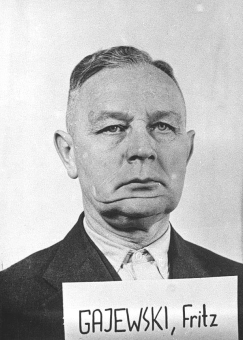Friedrich (Fritz) Gajewski (1885–1965)

© National Archives, Washington, DC
“As to Dr. Gajewski’s loyalty and personal integrity, all those who have known him in Germany as well as abroad will tell the Prosecution they are wrong, and as far as Dr. Gajewski’s feelings toward Germany are concerned, he loved and served his country as I imagine his colleagues in America loved and served their own.”[1]
Friedrich (Fritz) Gajewski was born in Pillau, Prussia, on October 13, 1885; his father, Wilhelm Gajewski, was a teacher. He had to end his schooling in Pillau and Königsberg after finishing the tenth grade, because his father could afford to send only a few of his 12 children on to complete the academic high school. Fritz Gajewski did an apprenticeship as a pharmacist. After his year as an assistant, he entered the University of Leipzig in 1905 to study chemistry and pharmacy, receiving his Ph.D. there in 1910. Then he did his required year of military service. In 1912, he began working in BASF’s main lab and dyeworks. He interrupted his lifelong career in the chemical industry from 1914 to 1917 to participate in World War I. In 1917, BASF called him back to serve as plant manager of the gas works in Oppau. That same year, Fritz Gajewski married Elisabeth Seckler. The couple had two daughters.
In 1922, he was made an authorized signatory at BASF, and in 1925 he became Carl Bosch’s assistant and a director of I.G. Farben. From then on, he worked increasingly in the area of photographic products: In 1928, he became technical director of Agfa, and in 1930 he took over the leadership of I.G. Farben’s Product Division III (photographic supplies, artificial silk, cellulose-based products). As such, he was simultaneously the contact man with Dynamit Nobel, to whose supervisory board he belonged between 1936 and 1945. In 1931, he was invited to join the I.G. Farben managing board as an alternate member, and in the period 1932–1945 he was a full member of the managing board. Fritz Gajewski joined the NSDAP in 1933. From 1940 onwards, he was a member of Farben’s Southeast Europe Committee. In this capacity, he made numerous trips to the production sites of I.G. Farben, including locations in Czechoslovakia, Hungary, and Romania. In 1942, he was named a “military economy leader” (Wehrwirtschaftsführer).
On October 5, 1945, he was arrested by the U.S. Army. In the I.G. Farben Trial in Nuremberg, he was acquitted on all charges, although the trial brought to light his denunciation of Jewish colleagues on the managing board
(SP; transl. KL)
















